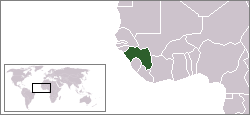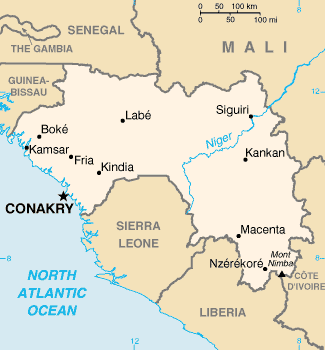This is an old revision of this page, as edited by 201.51.176.238 (talk) at 19:14, 6 May 2006 (→External links). The present address (URL) is a permanent link to this revision, which may differ significantly from the current revision.
Revision as of 19:14, 6 May 2006 by 201.51.176.238 (talk) (→External links)(diff) ← Previous revision | Latest revision (diff) | Newer revision → (diff)| Republic of GuineaRépublique de Guinée | |
|---|---|
 Flag
Coat of arms of Guinea
Coat of arms
Flag
Coat of arms of Guinea
Coat of arms
| |
| Motto: Travail, Justice, Solidarité (French: Work, Justice, Solidarity) | |
| Anthem: Liberté | |
 | |
| Capitaland largest city | Conakry |
| Official languages | French (official), Pulaar, Kissi, Kpelle, Maninka, Susu, Toma |
| Government | Republic |
| Independence | |
| • Water (%) | Negligible |
| Population | |
| • July 2005 estimate | 9,467,866 (85th) |
| GDP (PPP) | 2005 estimate |
| • Total | $20.74 billion (113th) |
| • Per capita | $2,200 (173th) |
| HDI (2003) | 0.466 low (156th) |
| Currency | Guinean franc (GNF) |
| Time zone | UTC0 (GMT) |
| Calling code | 224 |
| ISO 3166 code | GN |
| Internet TLD | .gn |
The Republic of Guinea (French: République de Guinée) is a nation in West Africa. It borders Guinea-Bissau and Senegal on the north, Mali on the north and north-east, the Côte d'Ivoire on the south-east, Liberia on the south, and Sierra Leone on the west. Its territory encompasses the water source for the Niger, Senegal, and Gambia rivers, with a coastline facing the Atlantic Ocean. The name Guinea (geographically assigned to most of Africa's west coast, south of the Sahara desert and north of the Gulf of Guinea) originates from Berber and roughly translates into 'land of the blacks.'
History
Main article: History of Guinea
The area covered by the modern state of Guinea has seen itself incorporated into a succession of empires across the centuries. The earliest of these was the "Ghana Empire" which came into being c. 900. This was followed by the Sosso kingdom in the 12th and 13th centuries. The Mali Empire came to power in the area following the Battle of Kirina in 1235. The Mali Empire prospered until internal problems weakened it, allowing its states to seize power in the 15th century. Chief among these was the Songhai state which became the Songhai Empire. This empire exceeded its predecessors in territory and wealth, but it too fell prey to internal wrangling and civil war and was eventually toppled at the Battle of Tondibi in 1591. After this the area fragmented until an Islamic state was founded in the 18th century, bringing some stability to the region.
Europeans first came to the area during the Portuguese Discoveries, who started the slave trade, beginning in the 15th century. Present-day Guinea was created as a colony by France in 1890 with Noël Balley being the first governor. The capital Conakry was founded on Tombo Island in 1890. In 1895 the country was incorporated into French West Africa.
Guinea gained her independence from France in 1958 and was governed by a dictatorship headed by Ahmed Sékou Touré. Touré pursued broadly socialist economic policies and suppressed opposition and free expression with little regard for human rights. After his death in 1984 Lansana Conté took power and immediately turned away from his predecessor's economic policies but continued to keep a close grip on power. Elections were held for the first time in 1993 but their results and the results of subsequent elections were disputed. Conté faces regular criticism for the condition of the country's economy and for his heavy-handed approach to political opponents. As of 2005 Guinea still faces very real problems and according to the International Crisis Group is in danger of becoming a failed state.
Politics
Main article: Politics of Guinea
Administrative Divisions
Main articles: Regions of Guinea, Prefectures of Guinea
Guinea is divided into 7 administrative regions and subdivided into 33 prefectures. The national capital, Conakry, ranks as a special zone.
The administrative regions include: Boké, Faranah, Kankan, Kindia, Labé, Mamou, Nzérékoré, and Conakry
Geography
Main article: Geography of Guinea
The highest point in Guinea is Mont Nimba at 5,748 feet (1,752 m).
The Country of Guinea is roughly the size of Oregon. There are 200 miles (320 km) of coastline. Guinea borders the countries of Cote d'Ivoire, Guinea-Bissau, Liberia, Mali, Senegal, and Sierra Leone. The total land border is 2,112 miles (3,399 km).

Sports
Guinea's main sport is soccer and although they have never made the World Cup Finals they have appeared at eight African Nations Cup finals; being runners up in 1976 and making the quarter finals in both 2004 and 2006. Swimming is popular near the capital, Conakry, and hiking is possible in the Fouta Djallon region.
Economy
Main article: Economy of Guinea
Guinea possesses major mineral, hydropower, and agricultural resources, yet remains an underdeveloped nation. The country possesses over 30% of the world's bauxite reserves and is the second-largest bauxite producer. The mining sector accounted for about 75% of exports in 1999. Long-run improvements in government fiscal arrangements, literacy, and the legal framework are needed if the country is to move out of poverty. Fighting along the Sierra Leonean and Liberian borders, as well as refugee movements, have caused major economic disruptions, aggravating a loss in investor confidence. Foreign mining companies have reduced expatriate staff. Panic buying has created food shortages and inflation and caused riots in local markets. Guinea is not receiving multilateral aid. The IMF and World Bank cut off most assistance in 2003. Growth rose slightly in 2004, primarily due to increases in global demand and commodity prices on world markets.
Demographics
Main article: Demographics of Guinea
Culture
Main article: Culture of Guinea
- Like other West African countries, Guinea has a rich musical tradition. The group Bembeya Jazz became popular in the 1960s after Guinean independence. The Vancouver-based guitarist Alpha Yaya Diallo hails from Guinea and incorporates its traditional rhythms and melodies into his original compositions, for which he has won two Juno Awards.
Miscellaneous topics
- Communications in Guinea
- Transportation in Guinea
- Military of Guinea
- Foreign relations of Guinea
- National Park of Upper Niger
- National Scout Association of Guinea
Language
References
| This article does not cite any sources. Please help improve this article by adding citations to reliable sources. Unsourced material may be challenged and removed. Find sources: "Guinea" – news · newspapers · books · scholar · JSTOR (Learn how and when to remove this message) |
External links
Government
- Permanent UN Mission of the Republic of Guinea official government site
Overviews
- Guinea's location on a 3D globe (Java)
- CIA World Factbook - Guinea
- BBC News Country Profile - Guinea
Music
- Cora Connection West African music resources
Directories
- Open Directory Project - Guinea directory category
- Stanford University - Africa South of the Sahara: Guinea directory category
- The Index on Africa - Guinea directory category
- University of Pennsylvania - African Studies Center: Guinea directory category
- Yahoo! - Guinea directory category
Tourism
| Countries and territories of Africa | |||||||||||
|---|---|---|---|---|---|---|---|---|---|---|---|
| Sovereign states |
| ||||||||||
| States with limited recognition | |||||||||||
| Dependent territories |
| ||||||||||
| African territories fully part of non-African states |
| ||||||||||